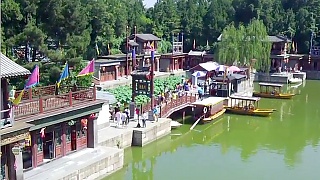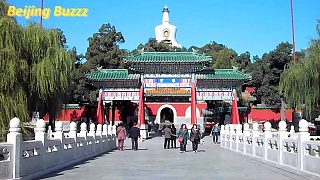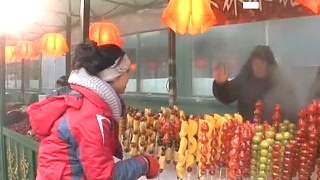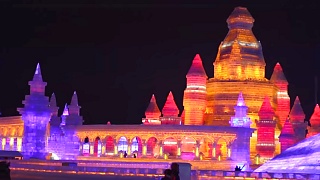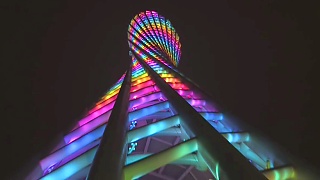Open roughly January and February every year (weather dependent); HeiLongJiang province, north East China. Nearest big city - Beijing.
[640],shadow=true,start=29,stop=Harbin, located in the northeastern part of China's Heilongjiang province, is known for its bitterly cold winters, Russian-influenced architecture, and the world-famous Harbin International Ice and Snow Sculpture Festival. Here's a guide for tourists visiting Harbin:
Ice and Snow Sculpture Festival:
Harbin Ice and Snow World: This massive winter wonderland features elaborate ice and snow sculptures, illuminated by colorful lights. Visitors can marvel at ice castles, sculptures of famous landmarks, and intricate ice carvings.
Sun Island International Snow Sculpture Art Expo: Located on Sun Island in the Songhua River, this exhibition showcases large-scale snow sculptures created by artists from around the world.
Ice Lantern Festival: Held in Zhaolin Park, the Ice Lantern Festival features stunning ice lanterns, sculptures, and ice slides. Visitors can also enjoy cultural performances, fireworks, and traditional activities like ice fishing.
Russian Influence:
Central Avenue (Zhongyang Street): This pedestrian street is lined with European-style buildings dating back to the early 20th century, reflecting Harbin's history as a Russian trading outpost. Visitors can explore shops, cafes, and restaurants housed in these historic buildings.
St. Sophia Cathedral: This iconic landmark is one of the largest Orthodox churches in China. Built in the Russian Byzantine style, the cathedral now serves as a museum showcasing Harbin's multicultural history.
Cultural Attractions:
Harbin Confucian Temple: This ancient temple complex dates back to the Qing Dynasty and is dedicated to the philosopher Confucius. Visitors can explore traditional Chinese architecture, gardens, and historic artifacts.
Harbin Snow Sculpture Art Expo: Held in Sun Island Scenic Area during the winter months, this exhibition features intricate snow sculptures created by talented artists from around the world.
Modern Attractions:
Harbin Polarland: This theme park offers the opportunity to see a variety of Arctic animals up close, including polar bears, beluga whales, and Arctic foxes. Visitors can also enjoy animal performances and interactive exhibits.
Siberian Tiger Park: Located on the outskirts of Harbin, this wildlife park is home to over 500 Siberian tigers, as well as other exotic animals such as lions, leopards, and lynxes. Visitors can take guided tours and observe the animals from a safe distance.
Practical Tips:
Weather: Harbin experiences extremely cold winters, with temperatures often dropping below freezing. Visitors should dress warmly and be prepared for snow and icy conditions.
Transportation: Harbin has an extensive public transportation system, including buses and trams, as well as taxis and ride-hailing services. The city is also served by Harbin Taiping International Airport.
Language: Mandarin Chinese is the official language, but English may not be widely spoken outside of tourist areas. It's helpful to learn a few basic phrases or carry a translation app.
Harbin's unique blend of Russian and Chinese influences, coupled with its spectacular winter festivities, makes it a captivating destination for tourists. Whether you're marveling at ice sculptures, exploring historic landmarks, or experiencing the city's cultural heritage, Harbin offers a memorable and immersive travel experience.
Beijing, the capital city of China, is a vibrant metropolis steeped in history, culture, and modernity. Here's a brief overview of what you can expect as a tourist in Beijing:
Historical Landmarks:
The Great Wall of China: One of the most iconic structures in the world, the Great Wall is easily accessible from Beijing. Mutianyu and Badaling sections are popular among tourists.
Forbidden City (Palace Museum): A UNESCO World Heritage Site, this vast imperial palace complex was home to Chinese emperors for over 500 years. It houses numerous halls, courtyards, and historical artifacts.
Temple of Heaven: A masterpiece of Chinese architecture, this ancient temple complex served as a place of worship for emperors to pray for good harvests.
Summer Palace: A stunning ensemble of lakes, gardens, and palaces, the Summer Palace served as a retreat for emperors during the Qing dynasty.
Tiananmen Square: One of the largest city squares in the world, Tiananmen Square is flanked by important landmarks such as the Monument to the People's Heroes, the Great Hall of the People, and the Mausoleum of Mao Zedong.
Cultural Sites:
Beijing Hutongs: Explore the narrow alleyways and traditional courtyard residences of Beijing's historic neighborhoods. You can take a rickshaw tour or simply wander around on foot.
Beijing Opera: Experience traditional Chinese opera performances at venues like the Liyuan Theater or the Chang'an Grand Theatre.
798 Art District: A hub of contemporary art and culture, this former industrial area is now home to numerous galleries, studios, and cafes.
Modern Attractions:
Olympic Park: Visit iconic structures such as the Bird's Nest (National Stadium) and the Water Cube (National Aquatics Center) from the 2008 Beijing Olympics.
CBD (Central Business District): Marvel at the futuristic skyline of Beijing's modern business district, which includes landmarks like the CCTV Headquarters and the China World Trade Center Tower III.
Culinary Delights:
Peking Duck: Indulge in Beijing's most famous dish, crispy roast duck served with pancakes, scallions, and hoisin sauce.
Street Food: Explore the city's vibrant street food scene and sample local delicacies like jianbing (savory crepes), lamb skewers, and dumplings.
Practical Tips:
Transportation: Beijing has an extensive public transportation system, including the subway, buses, and taxis. However, traffic can be heavy, so plan your travels accordingly.
Language: While English is not widely spoken, especially outside tourist areas, many signs and transportation announcements are in English. It's helpful to carry a translation app or a phrasebook.
Weather: Beijing experiences four distinct seasons, with hot summers and cold winters. The best times to visit are spring (April to June) and autumn (September to October) when the weather is mild and comfortable.
Etiquette: Respect local customs and traditions, such as removing your shoes before entering someone's home and using both hands to pass or receive items.
Beijing offers a rich tapestry of experiences for tourists, blending ancient heritage with modern innovations. Whether you're fascinated by history, culture, or culinary delights, there's something for everyone in this dynamic city.

 Winter China trip – Beijing to the Harbin Ice Festival, 2015
Winter China trip – Beijing to the Harbin Ice Festival, 2015